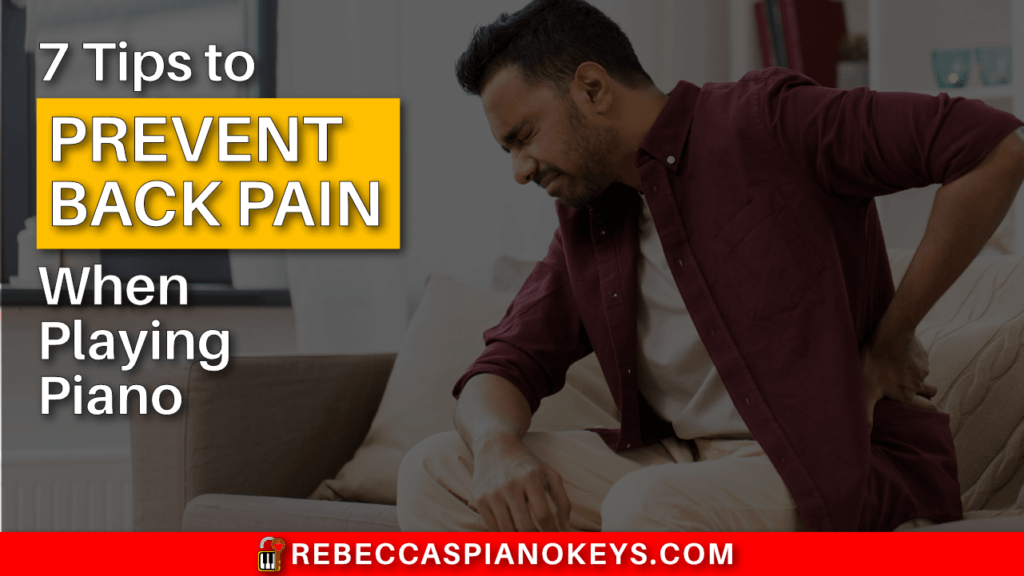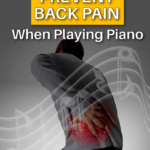Last Updated on May 31, 2022 by Rebecca
Disclosure: Please note that this article contains affiliate links, and that means that I may earn a commission if you buy something through my links. Read my full disclaimer here.
Do you find your back hurts after playing piano? Do you have to cut your piano practice sessions short because of back pain?
This is actually a very common problem among piano players.
But it's easily resolved with a few adjustments to your piano technique!
Keep reading to learn 7 tips that will help you to prevent back pain from playing piano.

Tip #1: Adjust the height of your bench.
An adjustable piano bench like this one will help you to achieve the proper alignment so you can minimize muscle tension, thus reducing back pain.

Tip #2: Sit near the front edge of your bench.
You should feel your sit bones very near the front edge of the bench.
Sitting too far back on the bench prevents you from distributing your weight correctly, which leads to tight muscles and (you guessed it!) back pain.
It also limits your range of motion, making it difficult to play with control, and to reach higher and lower notes.
Tip #3: Lean forward and ground your feet.
When you lean back on your piano bench (keeping your back straight and hingeing from the hips) you'll feel your feet getting lighter on the floor. You'll also feel your whole body tensing up as your muscles fight to stop you from falling over.
When you lean forward (still keeping your back straight and hingeing from the hips), you'll feel your feet getting heavier, grounding firmly into the floor.
In this position, you create a stable base for yourself. Your muscles don't have to fight against gravity to keep you upright. Instead, you use gravity to your advantage, allowing your muscles to relax as much as possible.
This position even allows your body weight to sink all the way from your shoulders down to your fingertips, which allows for even more relaxation in your muscles!
Tension is minimized, and your back pain is therefore also minimized!
Now, you may feel like you're leaning very far forward. It may even feel like your elbows are sticking far behind you. But if you look in a mirror, you'll see that you really aren't leaning that far forward (even though it feels like you are).
Tip #4: Tilt your pelvis back.
When you lean forward on your piano bench, you don't want to create an arch in your lower back. This puts a lot of stress on your lower back, which will definitely cause lower back pain!
Instead, you want to make sure you're maintaining healthy alignment of your spine, all the way from your tailbone up to your head.
If you notice that you're creating this arch in the lower back when you lean forward, simply press your hips into the bench, tilting your pelvis backwards slightly.
You should find this eases the pain in your lower back significantly.
Of course, it will take time to get used to this, so you should continually self-monitor while you practice, and adjust whenever you notice your lower back has arched again.
Tip #5: Consciously monitor and relax muscles while you play.
Some common signs of tension while playing the piano include:
- clenched jaw
- shoulders inching up toward ears
- elbows rising outward like chicken wings
- cramps in forearms, wrists, and/or hands
More often than not, tension stems from the larger muscle groups, then works its way into the smaller muscle groups. So make it a point to mentally check in with your shoulders and elbows frequently while you play piano.
Consciously lower your shoulders and elbows, and you'll feel a lot of tension instantly melt out of your body.
This will drastically reduce the amount of back pain you experience as a result of your piano practice.
Tip #6: Engage abdominal muscles.
A lot of the time, when your muscles tense up during piano practice, it's because they're compensating for other muscles that are not doing their job.
Ahem… we're talking to you, abs!
If you're not using your core muscles to support yourself, your other muscles will jump in to help keep you supported.
As Dr. Julie Knerr (one of the creators of the Piano Safari method) explains in Mini Essay 5: Technique Basics for Beginners:
“I tell the student to put any tension that wants to creep into the shoulders into his abdomen instead so that he plays the piano from a strong central core. If a student has a weak core, he is likely to compensate for his weak posture by putting tension in other parts of the body.”
– Dr. Julie Knerr, Mini Essay 5: Technique Basics for Beginners
Use your core when you play piano, and you'll find you experience less tension and less back pain during and after your piano practice.
Tip #7: Practice yoga.
Of course, it's difficult to use your core if your abdominal muscles are not strong.
So you also need to spend some time outside of your piano practice strengthening your core muscles.
Yoga is an excellent activity to strengthen your core muscles, and it will also help to improve your posture, your connection with the movement of your body, and your ability to move mindfully with your breathing.
All things that will have a positive impact on your piano playing abilities! (And your life in general as well!)
My personal favourite online yoga instructor is Adriene Mischler, who runs the channel Yoga with Adriene. I love that I can practice yoga for free, from the comfort of my own home, just by putting on one of her videos.
Need a yoga mat? I use this one, which I purchased on Amazon a few years back.
I like that it's made of TPE, so it doesn't have an odour, and it's grippy enough so that it doesn't slide around on the floor when I'm using it, and the 6mm thickness works well for me. And I love that it has alignment guides on it, so I can always tell if I'm lined up correctly in my poses!

How to Avoid Back Pain While Playing Piano
If you follow the 7 tips outlined above, you'll experience less back pain when practicing piano.
This means you'll be able to practice for longer periods of time, and you'll enjoy your piano practice a lot more!


